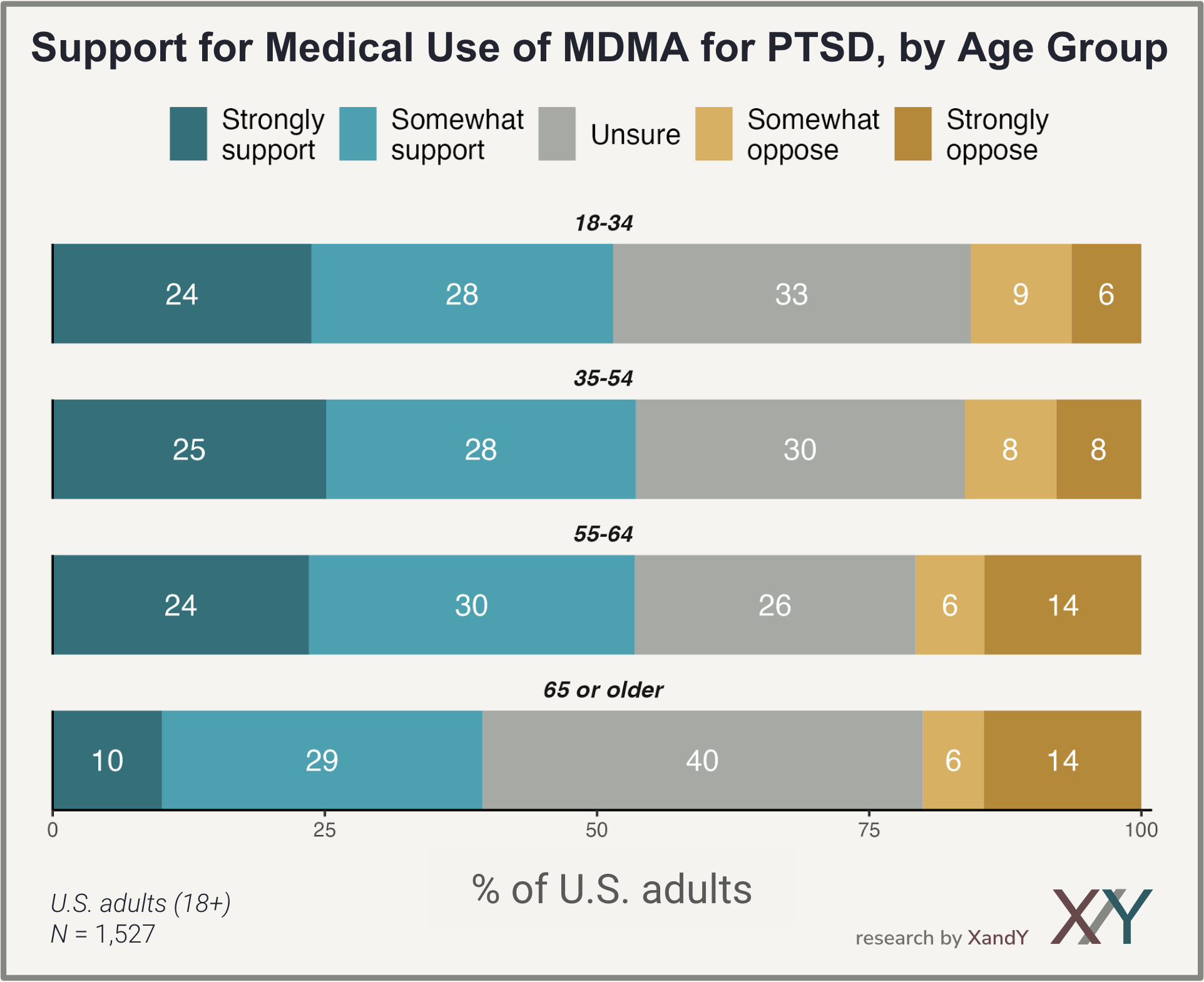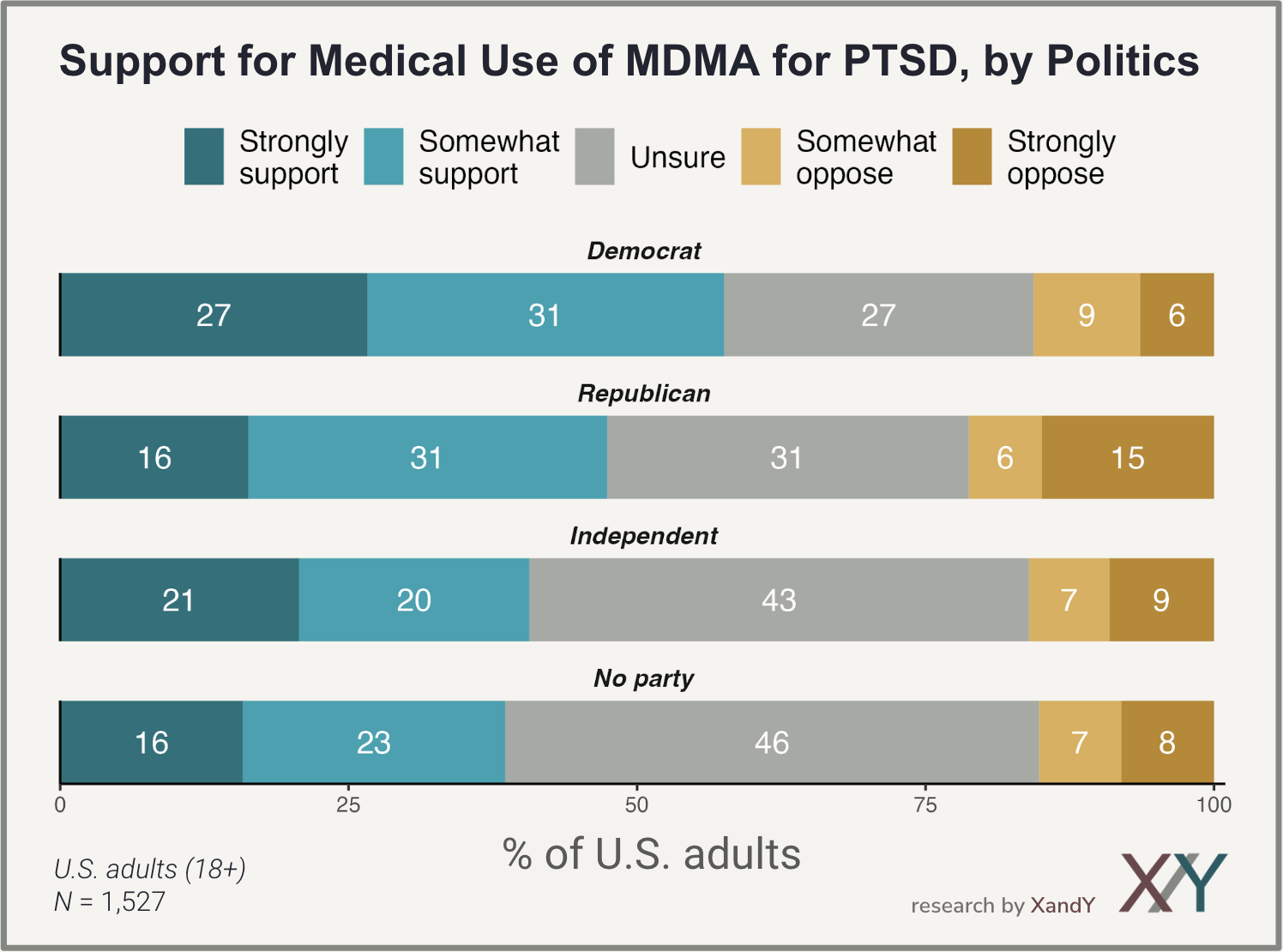Support for Allowing MDMA Treatment of PTSD Far Outnumbers Opposition
The XandY Poll | U.S. National Adult Population | Nov. 2023
Matthew Goldberg, Abel Gustafson, & Carly Wolfer
February 2024
MDMA, commonly known as Ecstasy or molly, is continuing to accrue evidence as a therapeutic breakthrough for treating Post-Traumatic Stress Disorder (PTSD). At a crucial time where MDMA is under review for FDA approval, its role in treating PTSD has sparked both scientific and public interest.
Public Support for Medical Use of MDMA
Parallel to the excitement among scientists and medical professionals, there are also signs of public support for therapeutic uses of MDMA. In our recent study, we found that 50% of Americans now support the medical use of MDMA in treating PTSD. It’s important to note that very few people in the US oppose this (only about 18%), and that about one in three Americans say they are unsure.
The fact that about one third of Americans are unsure means there are clear opportunities for building further public support on this important issue. We expect many of those people would support medical use of MDMA if they learned more about how much it is helping people, especially veterans.
Support for Medical Use of MDMA for PTSD by Age Group
There are some substantial age differences in support, though. The main group that sticks out is those who are 65 or older, among whom only 39% support. Again, it’s important to highlight that this is not because there is an oppositional majority, but rather because a larger proportion of this group (40%) simply reports being unsure.
Political Party Differences in Support for Medical Use of MDMA
On many controversial issues, a significant barrier to progress is politicization and partisan polarization. Fortunately, the differences between Democrats and Republicans aren’t nearly as large as with many other issues. We find 58% of Democrats and 47% of Republicans support the therapeutic use of MDMA. This is an encouraging sign for the potential of successful political action.
Although they are a small minority, it’s important to keep a close eye on the 15% of Republicans that strongly oppose allowing MDMA for treating PTSD. If they end up being disproportionately vocal about their opposition, people might falsely come to believe that most Republicans oppose this policy when in reality a near-majority of Republicans support it.
As we see across many other issues, Independents or people who do not affiliate with a political party are much less likely than partisans to have a clear opinion in either direction. That is, the proportion of Independents or Unaffiliated that report being unsure is substantially larger. This often comes with a tradeoff: these people might be easier to engage with because fewer of them have made up their minds about this issue, but they are also a small group and may have less influence on political officials who cater to the interests of one party.
So What
Our findings, together with the promising results of clinical trials, make us optimistic for the future of MDMA as a treatment for PTSD in the United States. The relatively high level of support among the general public underscores a recognition of the potential benefits of MDMA in mental health treatment. This is especially encouraging given that many (or even most) Americans still have not heard much about the significant therapeutic benefits MDMA can provide.
Looking ahead, the challenge and opportunity is in educating the significant portion of the population that remains unsure about the medical use of MDMA. Public communication campaigns, open dialogue, and continued dissemination of scientific findings could play a crucial role in turning tentative uncertainty into solid support. Because major victories in recent years have come through state-wide ballot initiatives, the importance of public support cannot be overstated.
About The XandY Poll
Survey Methodology
The design, data collection, analysis, and reporting of this national survey were performed by XandY, an independent research and strategy firm. Exhaustive details of the scientific methodology of The XandY Poll can be found here. The following briefly summarizes key points of interest.
The survey responses were fielded from November 18 – November 21, 2023 using online recruitment methods to sample adult residents of the United States (N = 1,527). This survey used a nested quota sampling strategy to match U.S. Census proportions of age, income, race and ethnicity, gender, and political party affiliation. To further ensure the insights reported from these data closely resemble the U.S. population, the sample was weighted to match U.S. Census benchmarks.
Percentage points are rounded to the nearest whole number. When sums of two proportions are reported in text (e.g., “63% of U.S. adults say they either “strongly” or “somewhat” support…") we round the total value after summing. Sometimes, this creates an apparent error. For example, 41.4% + 20.4% = 61.8% which rounds to 62%. But in the figure, the values are individually rounded (41% and 20%) so it might appear that 41% + 20% = 62%.
Margin of Error
Proportion statistics regarding the full national sample have an average margin of error of +/- 2 percentage points at the 95% confidence level. The margin of error in subgroups is determined by the subgroup size.
Citation
This paper and the insights it reports may be cited as:
Goldberg, M. H., Gustafson, A., & Wolfer, C. (2024). Support for Allowing MDMA Treatment of PTSD Far Outnumbers Opposition. XandY. New Haven, CT. Retrieved from: www.xandyanalytics.com/support-mdma-treatment-outnumbers-opposition



